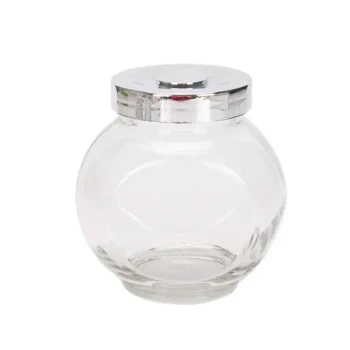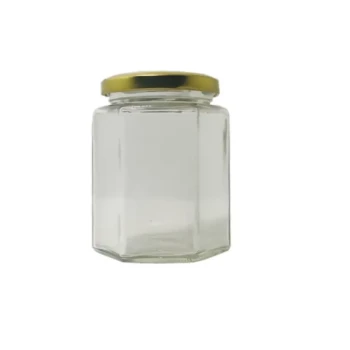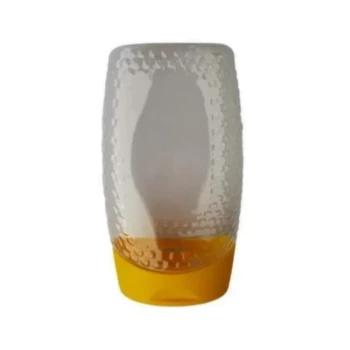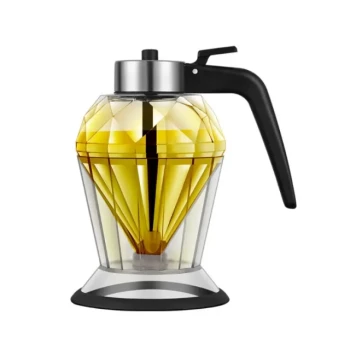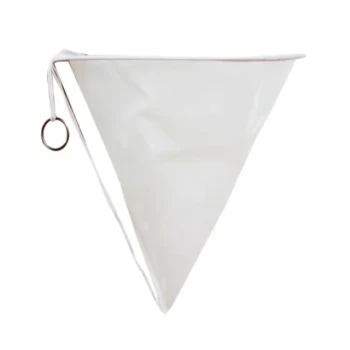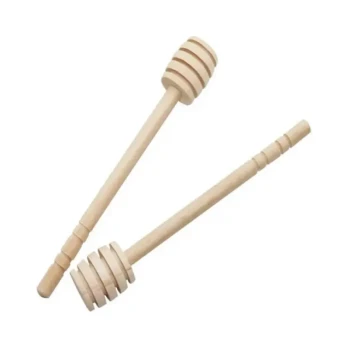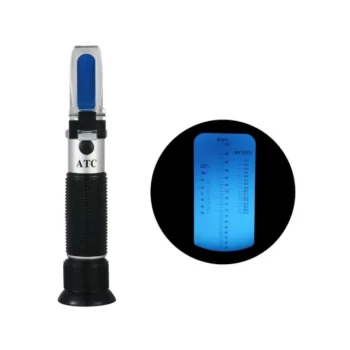For long-term storage, glass is the superior choice for honey. Its non-porous and inert nature provides the best possible protection against moisture and flavor contamination. However, food-grade plastic containers are also a safe and practical option for everyday use and shorter-term storage.
The ideal container is only one part of the equation. The most critical factors for preserving honey's quality are an airtight seal and a cool, dark environment, regardless of whether you choose glass or plastic.
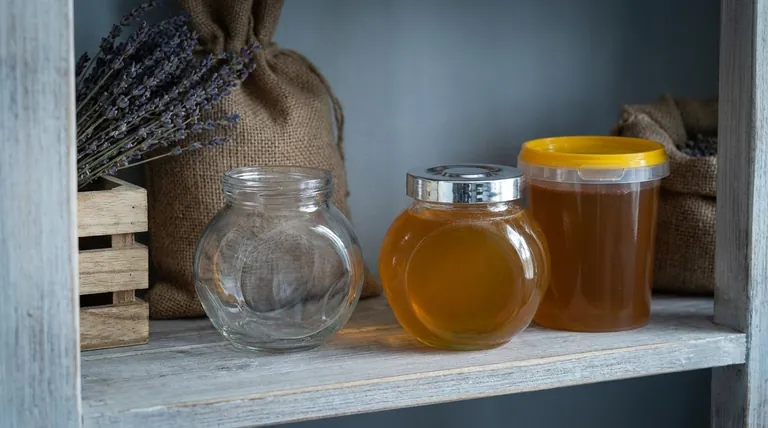
Why the Container Material Matters
The primary goal of a storage container is to create a barrier between the honey and the outside world. Both glass and food-grade plastic achieve this, but with subtle differences that are important for preservation.
The Case for Glass
Glass is the gold standard for long-term food preservation. Its molecular structure is extremely dense, making it impermeable to oxygen and moisture.
This is critical because honey is hygroscopic, meaning it readily absorbs moisture from the air. If honey's water content rises, it can begin to ferment.
Furthermore, glass is inert. It will not interact with the honey or leach any chemicals, ensuring the honey's flavor remains pure and untainted indefinitely.
The Role of Food-Grade Plastic
Food-grade plastic is a perfectly safe and common choice for storing honey. It is lightweight, shatter-resistant, and more convenient for daily handling.
When you see honey in a plastic container at the store, it is made from a polymer (like PET) that has been certified safe for contact with food. This ensures no harmful chemicals will transfer to the honey.
Critical Factors Beyond the Container
Choosing the right container is a good first step, but a poor storage environment will ruin honey regardless of what it's in. The true enemies of honey are air, light, and heat.
An Airtight Seal is Non-Negotiable
The single most important feature of your container is a tight-fitting lid. This prevents moisture from being absorbed from the atmosphere and protects the honey from foreign odors and contaminants.
Temperature and Light Degrade Quality
Honey should always be stored in a cool, dark place like a pantry or cupboard.
Direct sunlight and heat can degrade the beneficial enzymes in raw honey and cause its color and flavor to darken over time. Keeping it cool also helps slow the natural process of crystallization.
Why You Must Avoid Metal
Never store honey in containers made of metal, unless they are stainless steel or have a food-safe enamel coating. The acids in honey can react with many metals, causing oxidation.
This reaction can contaminate the honey, imparting a metallic taste and potentially spoiling it.
Understanding the Trade-offs
While both materials are good, understanding their inherent limitations helps you make an informed decision based on your specific needs.
Plastic's Practicality vs. Permeability
The main advantages of plastic are its low cost, light weight, and durability. It's the practical choice for everyday use.
However, over very long periods (many years), plastic can be slightly more permeable to air than glass, which could subtly affect the honey's quality.
Glass's Purity vs. Fragility
The primary benefit of glass is its complete inertness and impermeability, offering the purest long-term storage environment.
The obvious downsides are its weight and fragility. A dropped glass jar means a difficult cleanup and lost honey, a risk that is minimized with plastic.
Making the Right Choice for Your Honey
Your storage choice should align directly with your intended use for the honey.
- If your primary focus is long-term preservation: Choose a glass jar with a tight-fitting, non-metallic lid to ensure purity for years or even decades.
- If your primary focus is convenience and daily use: A food-grade plastic container is perfectly acceptable and offers practical benefits like being lightweight and shatterproof.
- If your primary focus is preserving a delicate, artisanal flavor: Use glass to eliminate any possibility of the container interacting with the honey's nuanced profile.
Ultimately, protecting your honey is about creating a stable fortress against the elements.
Summary Table:
| Container Type | Best For | Key Benefits | Key Considerations |
|---|---|---|---|
| Glass | Long-term storage, preserving delicate flavors | Impermeable, inert, prevents flavor contamination | Fragile, heavier |
| Food-Grade Plastic | Daily use, convenience | Lightweight, shatter-resistant, cost-effective | Slightly permeable over very long periods |
Protect Your Honey's Quality with the Right Supplies
Whether you're a commercial apiary focused on large-scale honey preservation or a distributor stocking reliable beekeeping equipment, the right storage containers are crucial for maintaining product integrity.
At HONESTBEE, we supply high-quality, wholesale-focused beekeeping supplies and equipment designed for durability and performance. From airtight glass jars to certified food-grade plastic containers, our products help you safeguard your honey's flavor and extend its shelf life.
Let us equip your operation with storage solutions that meet your specific needs. Contact HONESTBEE today to discuss your wholesale requirements and ensure your honey remains pure and market-ready.
Visual Guide
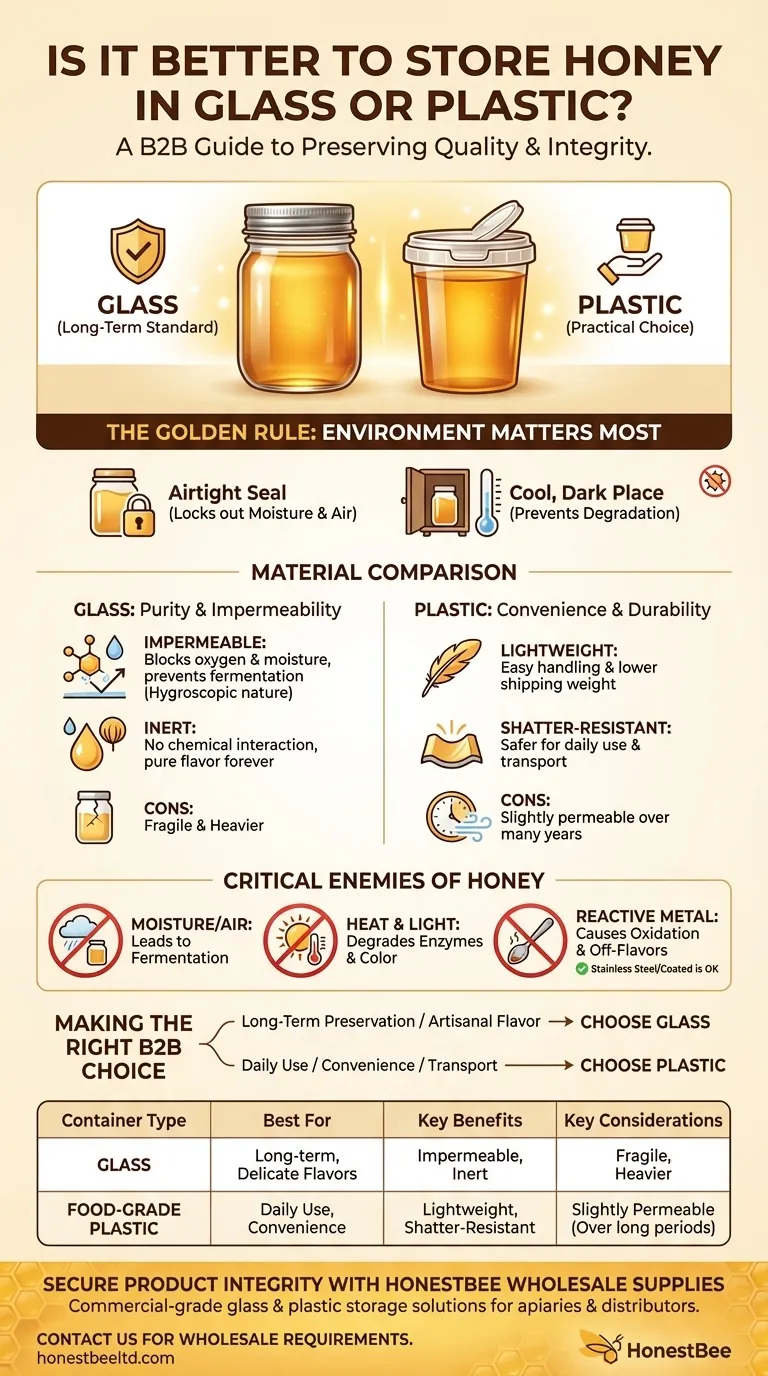
Related Products
- Classic Drum Shaped Glass Honey Jar with Airtight Lid
- Hexagonal Glass Honey Jars with Metal Lug Caps Elegant Versatile Packaging
- Inverted Squeezable Honey Jar with No Drip Flip Top Cap for Easy Pouring
- Premium Diamond-Faceted Glass Honey Dispenser
- High Performance Plastic Queen Excluder for Beekeeping and Apiary Management
People Also Ask
- What role does peracetic acid play in the cleaning process? Ensure Sterile Beekeeping Glassware and Product Purity
- Why are dark glass bottles used as packaging consumables for drone larvae homogenate? Essential Light Protection Tips
- How does the appearance of glass jar packaging affect the sales and perception of honey? Boost Your Premium Brand Value
- How does small-scale retail packaging influence the market value of processed honey? Boost Your Brand and Margins
- What is the market significance of offering honey in various packaging sizes? Unlock Retail Success & Premium Value
- Why is it necessary to store honey samples in airtight, clean bottles? Ensure Accurate Lab Analysis and Data Integrity
- What are the advantages of using high-transparency glass containers in honey packaging? Enhance Purity and Trust
- How do specialized honey containers preserve stingless bee honey? Protect Your Harvest Quality and Value
